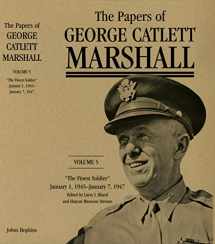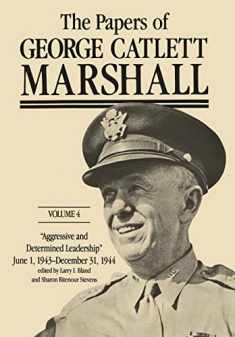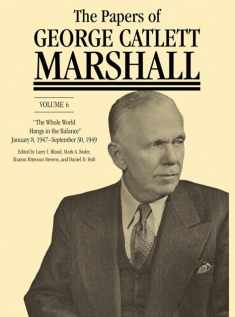
The Papers of George Catlett Marshall: "The Finest Soldier," January 1, 1945–January 7, 1947 (Volume 5)
Book details
Summary
Description
The two years covered in the fifth volume of The Papers of George Catlett Marshall were among the most momentous in the life of Army Chief of Staff George C. Marshall―and in the course of the twentieth century. A year of transitions for Marshall, 1945 witnessed the final assault on Nazi Germany and the use of atomic weapons against Japan. Allied forces under the command of Marshall's protege, Dwight D. Eisenhower, had contained Hitler's Ardennes offensive at the beginning of the year and launched the final drive to smash the German regime.
The war against Japan seemed far from over, however, and Marshall was deeply involved in planning for the massive and difficult redeployment of troops and materials from Europe to the Pacific. The debate with the U.S. Navy over supreme command of the invasion of Japan continued through the first six months of the year until Marshall secured Douglas A. MacArthur's appointment. In May and June, the chief of staff was involved in the decision to use the new atom bomb.
Military-related political problems continued to consume much of Marshall's time as the Second World War drew to a close, although he was only peripherally involved in the Big Three conferences at Yalta and Potsdam. Instead, demobilization and readying U.S. Army ground and air forces for the postwar era were Marshall's chief concerns. He pressed for a unified military department against navy opposition and also lobbied incessantly for universal military training for all physically fit eighteen-year-old males as the key element in the nation's military readiness and deterrent value.
After the fighting ceased, Marshall expected to retire, having served on active duty since 1902, but President Truman kept him in office until late November 1945. The day after his retirement, the president asked him to go to China to mediate in that country's increasingly violent civil war. Despite his initial success in negotiating a cease-fire between the Nationalists and Communists, irreconcilable differences soon led to renewed fighting. Marshall's continued hopes for achieving a political compromise, along with knowledge that his mission was the only hope for avoiding a disaster in China, kept him in the country until early 1947. He returned to the United States only when the president announced that General Marshall would join his cabinet as secretary of state.
From The Papers of George Catlett Marshall
"The one great element in continuing the success of an offensive is maintaining the momentum. This was lost last fall when shortages caused by the limitation of port facilities made it impossible for us to get sufficient supplies to the armies to continue their sweep into Germany when they approached the German border. Once additional ports had been captured and reopened there was a shortage of rail and transportation facilities with which to get supplies forward. Now the port facilities and the interior supply lines are adequate. Subject to the worldwide shortage of both cargo and personnel shipping, there is no foreseeable shortage which will be imposed by physical events in the field."―Speech to the Overseas Press Club, March 1, 1945
"Today we celebrate a great victory, a day of solemn thanksgiving. My admiration and gratitude go first to those who have fallen, and to the men of the American armies of the air and ground whose complete devotion to duty and indomitable courage have overcome the enemy and every conceivable obstacle in achieving this historic victory."―Marshall V-E Day Radio Address, May 8, 1945
"Just a few months ago the world was completely convinced of the strength and courage of the United States. Now they see us falling back into our familiar peacetime habits. They witness the tremendous enthusiasm with which we mount demobilization and reconversion, but they see as yet no concrete evidence that we are determined to hold what we have won―permanently. Are we already at this early date inviting that same international disrespect that prevailed before this war? Are we throwing away today what a million Americans died or were mutilated to achieve? Are we already shirking the responsibility of the victory?"―Speech to the New York Herald Tribune Forum, October 29, 1945


We would LOVE it if you could help us and other readers by reviewing the book
Book review





